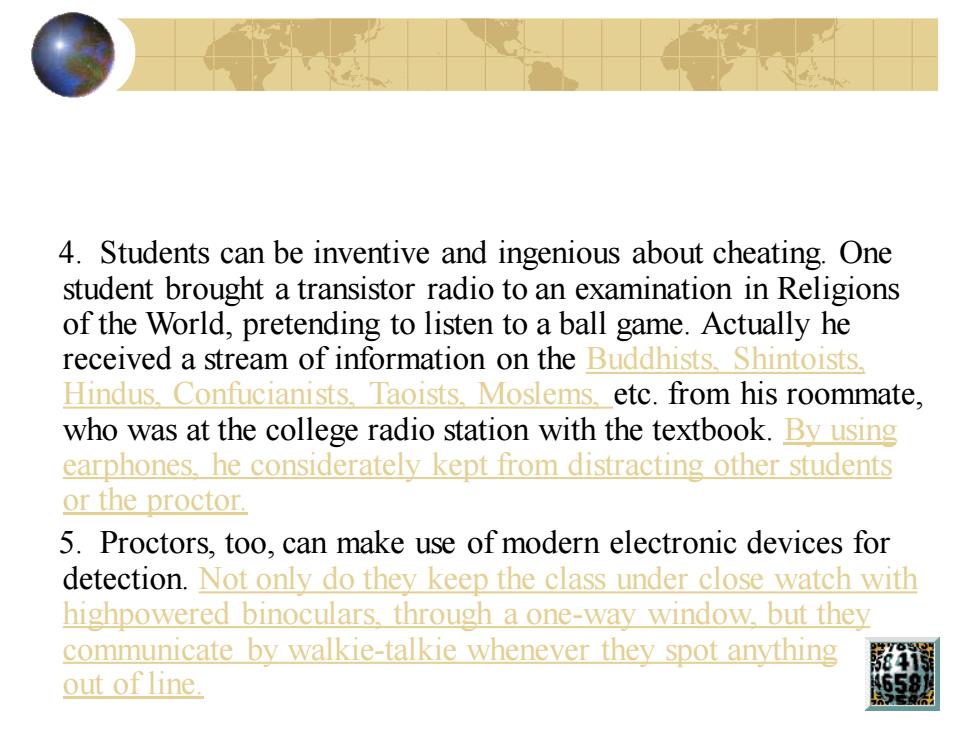
4.Students can be inventive and ingenious about cheating.One student brought a transistor radio to an examination in Religions of the World,pretending to listen to a ball game.Actually he received a stream of information on the Buddhists.Shintoists. Hindus.Confucianists.Taoists.Moslems.etc.from his roommate, who was at the college radio station with the textbook.By using earphones.he considerately kept from distracting other students or the proctor. 5.Proctors,too,can make use of modern electronic devices for detection.Not only do they keep the class under close watch with highpowered binoculars.through a one-way window.but they communicate by walkie-talkie whenever they spot anything out of line
4. Students can be inventive and ingenious about cheating. One student brought a transistor radio to an examination in Religions of the World, pretending to listen to a ball game. Actually he received a stream of information on the Buddhists, Shintoists, Hindus, Confucianists, Taoists, Moslems, etc. from his roommate, who was at the college radio station with the textbook. By using earphones, he considerately kept from distracting other students or the proctor. 5. Proctors, too, can make use of modern electronic devices for detection. Not only do they keep the class under close watch with highpowered binoculars, through a one-way window, but they communicate by walkie-talkie whenever they spot anything out of line
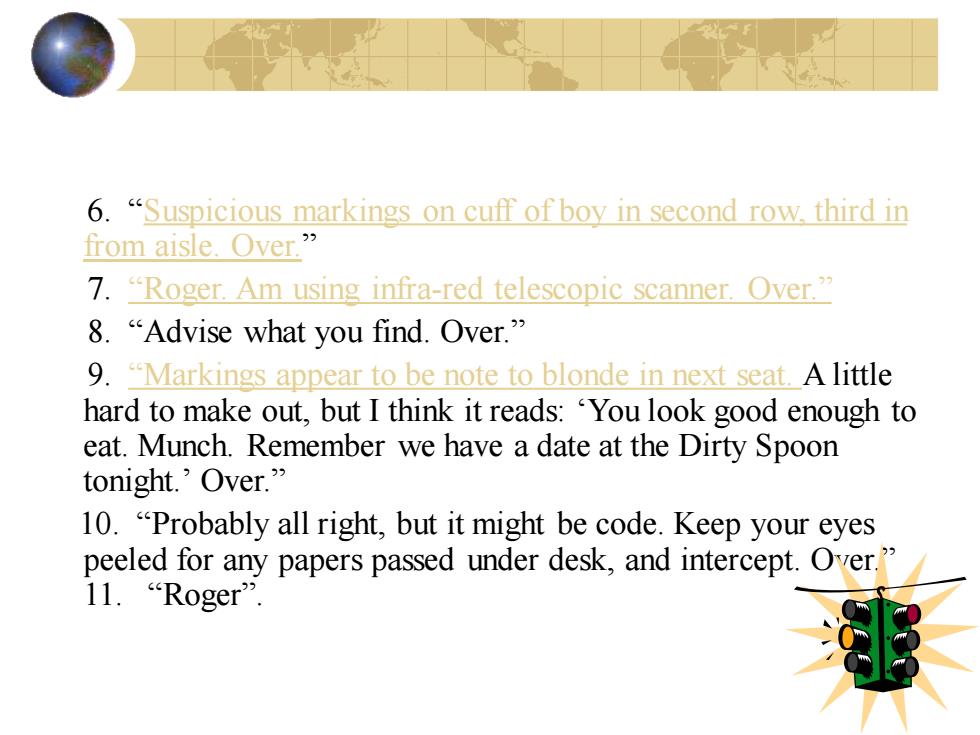
6."Suspicious markings on cuff of boy in second row,third in from aisle.Over” 7."Roger.Am using infra-red telescopic scanner.Over." 8.“Advise what you find..Over.” 9."Markings appear to be note to blonde in next seat.A little hard to make out,but I think it reads:'You look good enough to eat.Munch.Remember we have a date at the Dirty Spoon tonight.’Over.” 10."Probably all right,but it might be code.Keep your eyes peeled for any papers passed under desk,and intercept.Over. 11.“Roger?
6. “Suspicious markings on cuff of boy in second row, third in from aisle. Over.” 7. “Roger. Am using infra-red telescopic scanner. Over.” 8. “Advise what you find. Over.” 9. “Markings appear to be note to blonde in next seat. A little hard to make out, but I think it reads: ‘You look good enough to eat. Munch. Remember we have a date at the Dirty Spoon tonight.’ Over.” 10. “Probably all right, but it might be code. Keep your eyes peeled for any papers passed under desk, and intercept. Over.” 11. “Roger
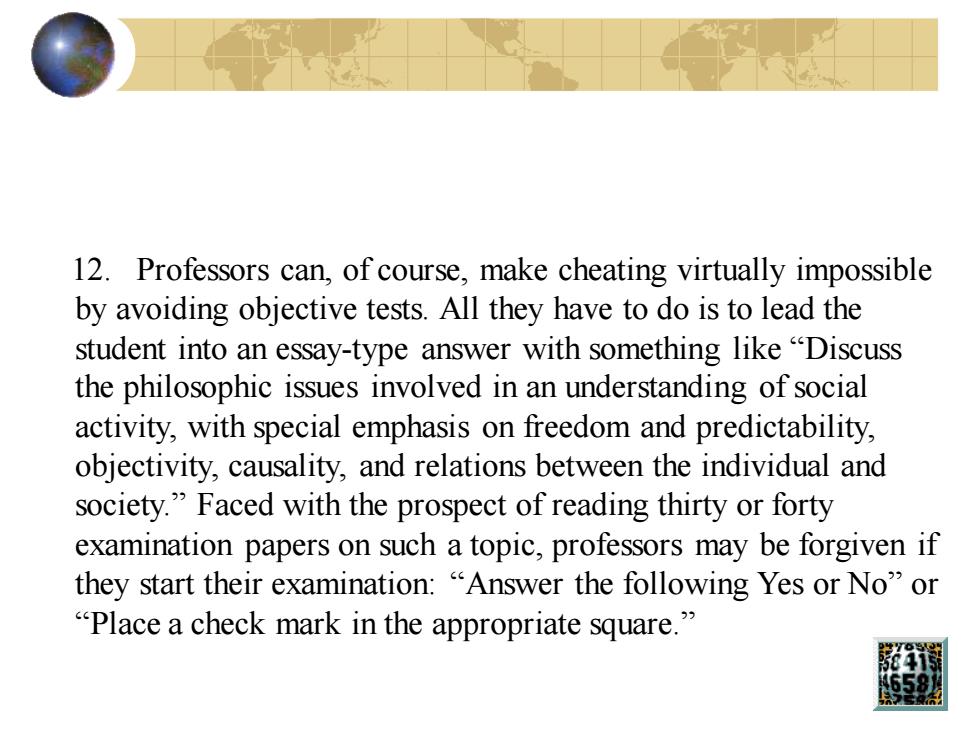
12.Professors can,of course,make cheating virtually impossible by avoiding objective tests.All they have to do is to lead the student into an essay-type answer with something like "Discuss the philosophic issues involved in an understanding of social activity,with special emphasis on freedom and predictability, objectivity,causality,and relations between the individual and society."Faced with the prospect of reading thirty or forty examination papers on such a topic,professors may be forgiven if they start their examination:"Answer the following Yes or No"or "Place a check mark in the appropriate square
12. Professors can, of course, make cheating virtually impossible by avoiding objective tests. All they have to do is to lead the student into an essay-type answer with something like “Discuss the philosophic issues involved in an understanding of social activity, with special emphasis on freedom and predictability, objectivity, causality, and relations between the individual and society.” Faced with the prospect of reading thirty or forty examination papers on such a topic, professors may be forgiven if they start their examination: “Answer the following Yes or No” or “Place a check mark in the appropriate square
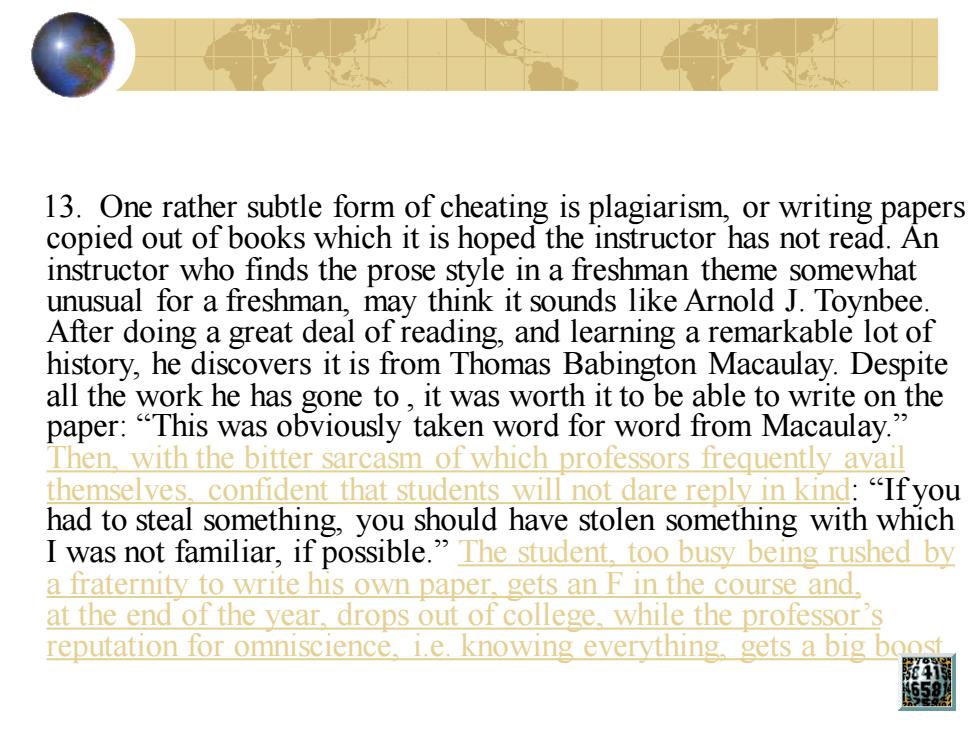
13.One rather subtle form of cheating is plagiarism,or writing papers copied out of books which it is hoped the instructor has not read.An instructor who finds the prose style in a freshman theme somewhat unusual for a freshman,may think it sounds like Arnold J.Toynbee. After doing a great deal of reading,and learning a remarkable lot of history,he discovers it is from Thomas Babington Macaulay.Despite all the work he has gone to,it was worth it to be able to write on the paper:"This was obviously taken word for word from Macaulay." Then.with the bitter sarcasm of which professors frequently avail themselves.confident that students will not dare reply in kind:"If you had to steal something,you should have stolen something with which I was not familiar,if possible."The student.too busy being rushed by a fraternity to write his own paper.gets an F in the course and. at the end of the year.drops out of college.while the professor's reputation for omniscience.1.e.knowing everything.gets a big boost
13. One rather subtle form of cheating is plagiarism, or writing papers copied out of books which it is hoped the instructor has not read. An instructor who finds the prose style in a freshman theme somewhat unusual for a freshman, may think it sounds like Arnold J. Toynbee. After doing a great deal of reading, and learning a remarkable lot of history, he discovers it is from Thomas Babington Macaulay. Despite all the work he has gone to , it was worth it to be able to write on the paper: “This was obviously taken word for word from Macaulay.” Then, with the bitter sarcasm of which professors frequently avail themselves, confident that students will not dare reply in kind: “If you had to steal something, you should have stolen something with which I was not familiar, if possible.” The student, too busy being rushed by a fraternity to write his own paper, gets an F in the course and, at the end of the year, drops out of college, while the professor’s reputation for omniscience, i.e. knowing everything, gets a big boost
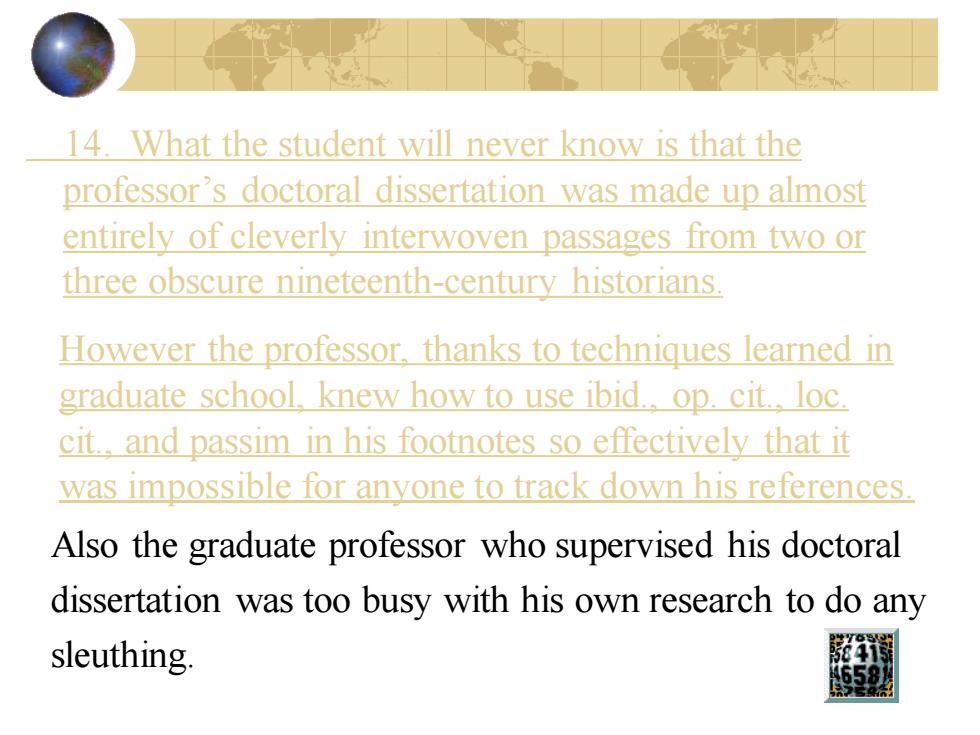
14.What the student will never know is that the professor's doctoral dissertation was made up almost entirely of cleverly interwoven passages from two or three obscure nineteenth-century historians However the professor,thanks to techniques learned in graduate school,knew how to use ibid..op.cit..loc. cit.,and passim in his footnotes so effectively that it was impossible for anyone to track down his references. Also the graduate professor who supervised his doctoral dissertation was too busy with his own research to do any sleuthing
14. What the student will never know is that the professor’s doctoral dissertation was made up almost entirely of cleverly interwoven passages from two or three obscure nineteenth-century historians. Also the graduate professor who supervised his doctoral dissertation was too busy with his own research to do any sleuthing. However the professor, thanks to techniques learned in graduate school, knew how to use ibid., op. cit., loc. cit., and passim in his footnotes so effectively that it was impossible for anyone to track down his references